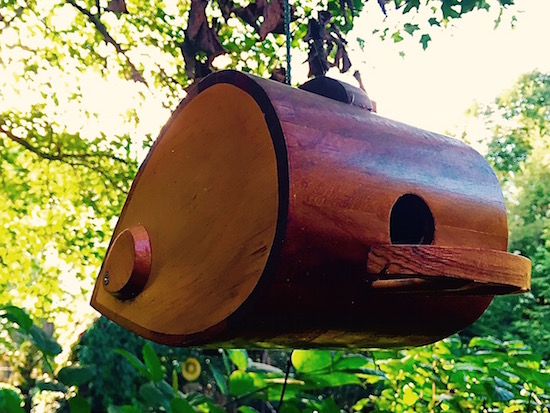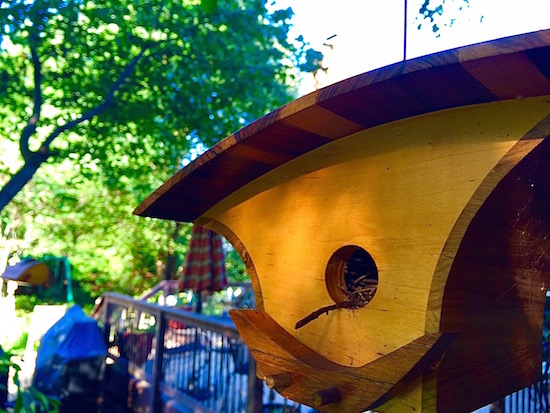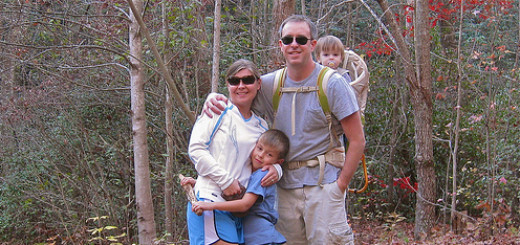Giggling at hell
There’s a man who makes birdhouses. He’s a jolly guy, the kind you’d think would be good to suit up as Santa come December. He’s a craftsman who hits the southeastern arts festivals, sits in a comfortable chair under an awning, and laughs when you tell a story just right.
I’ve visited this guy for the past two years. Both times I stood under the shade of his booth, and I’ve tried to figure out how he turned raw wood into something so different than it was before he touched it. He’s bent and warped the wood into these perfect parabolas. He’s stained the pieces into rich or bright colors. He’s pieced it all together and hung it on a parachute cord for me to buy. What he’s created would not exist but for his hands, and yet it looks perfectly at home in nature.
When I finally pick out the one I want, he remembers aloud about the time he spent making it in his workshop, tells me where he got the wood, and-if you listen just right-has just the hint of remorse in his voice that he has to sell the birdhouse at all. He made it to make the world more beautiful, but its destiny was always that he would let it go.
But sell it he does, and off I walk into the street with a piece of his heart hanging from a red piece of paracord.
My younger son turned six this year. He’s in kindergarten-big boy school, as he thinks of it-and shares a school building with his fifth-grade brother. It’s the only time in their lives they will go to school under the same roof.
It’s at the dinner table the little guy reveals, “We had a Full Lockdown drill at school today.”
He’s been picking at his food around our family round table, annoyed that he has to eat anything at all, resentful that goldfish crackers and squeezable yogurt are once again not on the menu. Now he’s smiling.
“We all went into our bathroom,” he says, his voice rising on the last syllable to let us know he’s not finished with his sentence, “and I was laughing.”
The fifth grader looks over his plate without raising his chin.
“You shouldn’t do that,” he says. “It could be real. A real man, with a real gun who is going to kill everybody.”
Little man is all smiles. “I couldn’t help it! It was so quiet! It was funny!”
He doesn’t understand why no one else is laughing, why the table is silent except for the clinking of forks against ceramic plates, why his brother is silently shaking his head in a knowing way a fifth grader shouldn’t know.
Our back yard has two of the jolly man’s birdhouses hanging from a misshapen tree. There are two birdseed feeders a few feet away. Four red antique-looking bottles hang in a scatter-shot pattern around the perimeter, all half-full of hummingbird nectar. We watch the birds through our windows-little finches, manic hummingbirds, selfish woodpeckers, and curious brown thrashers-and they remind us of things we like to remember.
It was a thrasher that killed itself against one of the windows. I was writing in one of our sun porch chairs when the bird lost track of itself and darted forehead-first into the glass. I watched it through the window, breathing, twitching, trying to come to. I hoped the kind of hope you don’t usually use on a bird, the kind that you know isn’t going to end with any sort of smile.
The thrasher died before I had a chance to put it out of its misery. I gave it more time, convincing myself for a moment-and with a pleading Monty Python voice-that it was “just resting.” It wasn’t, so I gave the bird its last rites unceremoniously and quickly enough that nobody else would have to see it all happen.
And, for a bit, I blamed myself for inviting the damned thing into our yard to eat in the first place.
Drills are nothing new to schools.
I remember seeing pictures of children hiding under rickety desks, their chicken-scratched schoolwork and a half-inch of old wood as their only protection from a nuclear blast.
When I was a grade-schooler in southern Missouri, we would file into the hallways to duck-and-cover against the cinderblock walls, the safest place we’d have if a tornado came barreling out of northeast Oklahoma.
Fire drills, hurricane drills, earthquake drills, they’re all nothing new to education. We put our children under one roof hoping they become better than we can make them on our own. In doing so we cede our ability to put ourselves between their little bodies and whatever hell may come out of the sky. They go to school and they learn their ABCs in tandem with an education in disaster. It should be comforting.
I look at my son nudging his niblets of corn around his plate. I imagine him crowded into a little bathroom with a couple dozen other 45-pound kids, children still so young and thin you can see the veins in their little chests, the thin purple pathways their blood takes to make their hearts pump. I picture their teacher wincing through tears and holding a shushing finger to her lips while the children giggle and a man with a big gun stalks the kindergarten hallway. I imagine my older son down two hallways, crowded into another bathroom, all-too-aware that he’s not in the middle of a drill.
And I can’t breathe. I can’t taste my food. I can’t even see across the five feet of dinner table to see if my wife can swallow what she just chewed.
Yes, drills are nothing new in schools, but today’s drills-the ones my kid too-casually calls Full Lockdowns, as if they are just something that happens between art and gym class-are a hell I don’t want to face. Because, here’s the thing: when my parents drilled, they were hiding from a faceless Cold War enemy who was thousands of miles away. When we drilled as kids, we hid from nature-Acts of God, if you will-and the kind of demons that come arbitrarily out of the sky to kill with no target, aim, or purpose. We practiced hiding from something we could predict would happen with just enough frequency that we should know how to protect ourselves from it.
I remember the day I was in Mr. Gould’s history class when a guy from my rural high school was said to be walking down the road with a shotgun. We were all told to be on the lookout for him because there was a chance he was on the way to us. He never came, and we never mentioned it much after that again. We never drilled on it, and we never had to regret not doing so.
But today…today we know there will be someone in a school with a gun with just enough frequency that it’s worth our time to practice how to hide from him. Put another way, part of our children’s education in 2015 is to practice not getting murdered.
I don’t remember how our dinner ended.
“A sad thing just happened,” my wife said from halfway up the stairs. I met her at the top, and she looked like she might cry. For half a second, I was sure someone had died.
She led me down to our back door. On the mat outside sat a blue-green finch, alive but immobile, its baby mouth upturned like it was asking for a worm. The bird had flown into the back door and fell immediately down. Again, I watched through the glass and decided we had probably been in some way responsible. Too many birds, too many windows. At this rate, we’re going to have to have all of our windows replaced, but that’s probably no bad thing as they are starting to look a little tired. I’ve been looking at Kelly Window and Doors to see what’s available and it’s actually quite an exciting prospect. One thing I do know is that they’ll have to be pretty hard wearing to withstand all these collisions.
I walked outside and left my wife in the house. I crouched beside the bird. I could see in its mouth. In its eyes. There was no blood. There was an awareness that something was wrong, and-okay, I’m almost certainly projecting here-a longing for everything to be okay.
I knew how it was going to end, so I picked up the welcome mat-sorry for the irony, birdy-and carried it to the other side of the fence where no one would see me.
Loving anything is a tough business, no matter whether you make it out of wood to sell, feed it as a stray, or create it as a parent. It’s a process of giving up so much of your heart that your chest stays open forever. A woodworker from North Carolina makes little homes, and those little homes become nests for tiny birds who flit and fly around too-clear windows, and inside that bigger home are people who know nothing fully except their love for each other. There is no easy thread to follow from one to the other except for the fact that their love-no matter how it manifests-is vulnerable to sincere and sometimes terrible loss.
When I think of my children practicing how to not be murdered, I can’t bear the idea of them going to school at all. I sit and think of how the windows to their classroom are too big and too clear, how a bird will bounce off and die but a bullet will shatter everything, including me. I think about escape routes, and statistics, and terror, and guns, and madness, and hate, and the fact that today’s inescapable reality is that we equate mass murder with a natural disaster to be endured rather than a disease to be eradicated.
I thought of all of this again as I crouched beside the finch in the privacy of a patch of sunshine. I nudged his tail feathers and tried to get him to fly. He couldn’t but not because his wings were bad. His little talons were caught in the fabric. He was stuck.
I reached down, pulled him free, and sat him in the flowerbed. He just sat there, beak open, waiting for some mama finch to come and lead him back to the house.
I wanted to sit and wait with him. I wanted to see him get rescued and be safe. I needed to know that something was going to watch over him.
But I knew this: if I stayed, if I continued to hover and cast my shadow over him, nothing would ever come and save him, and he would just wait for me to move him again, his mouth open, eyes in the sun.
I turned my back and left him there for nature, a stray cat, a bully hawk, a stupid squirrel, or whatever natural fate may take him.
I tried to stay gone, but I couldn’t. I’d barely poured myself a glass of water before I went back to check on the bird again.
He was gone. It had been less than five minutes, and he was gone from that patch of sunshine where I left him.
I thought of the worst-scattered blue-green feathers and nothing else-and then I stopped in the sunshine and looked at my house, the place where my children come home from school every day and fill the walls with shrieks and laughter.
Nothing can make me reconcile the fact that mass murder has become an Act of God in America, but that doesn’t change that fact that it’s so. And if it is so, then perhaps I have to come to grips with the fact that my children must practice how to be vigilant and careful in a storm that rains bullets instead of hail. If they practice hard enough, maybe they will always make it home and my house will stay full of the laughter that keeps me alive, just as-I hope-that little bird made it up into the sunshine, over the fence, and back to that little house the jolly man from North Carolina built.
Like Rapid Eye Reality on Facebook
Top photo courtesy James Vaughan via Creative Commons





Most beautiful and true thing I’ve read in ages. Please publish a book of these. I will have my Christmas list for everyone taken care of in one fell swoop.
Thanks, Rebekah. Not a terrible idea…
Oh, Brad! “. . . today’s inescapable reality is that we equate mass murder with a natural disaster to be endured rather than a disease to be eradicated.” This is the most powerful statement I have encountered in a long while. It resonates so deeply–as a mother, as a teacher, as a human. You’ve quite a gift, my friend. I enjoy your writing immensely.
“But today…today we know there will be someone in a school with a gun with just enough frequency that it’s worth our time to practice how to hide from him.”
I guess that what’s “worth our time” is ultimately a subjective decision. But I am firmly convinced that it is NOT worth our time for kids to practice hiding like this. Statistically, the average school will have to go thousands of years before it sees an active shooter, at current rates. That’s just too rare for widespread drills to be a rational response.
I think this is especially so when you take into account three other factors: (1) There is no evidence that these drills do one damn bit of good. How many children at Sandy Hook were saved by hiding? Zero. (2) There are real, substantial costs: Millions of kids are frightened. Education is interrupted. Once in a while somebody gets hurt in the drills–having a panic attack or a seizure or whatever. (3) Having drilled the kids, paranoid school administrators feel the need to deploy the techniques with a rapidly dropping threshold. A bank was robbed across town? Lock down all the schools! Something bad might happen!
It’s all a manifestation of mass paranoia, unjustified by the magnitude of the actual threat, which is minuscule.
You would be doing your kids and the whole community a great service by leading a movement by parents to demand that the schools stop subjecting your kids to these things. Because the truth is that these drills are not a remedy for the problem of endangered kids. They are a remedy for the problem of frightened parents. Frightened parents do not, in my view, have the right to relieve their anxieties by foisting them off onto their children. Yet that is precisely what these drills do: make the parents (and school administration) feel better because they’re “doing something,” at the expense of the children’s sense of security and safety.
If it actually accomplished something worthwhile, you could maybe justify that. But it doesn’t.
Beautifully written. Thank you so much for sharing this.
I’ve recently been trying to figure this out in my mind. I’m British, and because of our tight gun laws since Dunblane (1996) school shootings don’t happen here, so I’ve struggled to understand how they happen with such increasing frequency in America, and yet the gun laws are never tightened.
Having debated the issue with American friends, it seems to me that Americans accept the school (and other) shootings as an inevitable price which has to be paid for having the right to bear arms. These things are tragic, but the second amendment is so important that they are acceptable collateral damage. In a country with as many guns as there are people, this sort of thing is to be expected.
So that follows that if you expect it, you should prepare for it. Personally I think it;s shocking and terrible that this type of Lockdown procedure should be practised, but it makes sense for the culture. Similarly, we don’t have practices for tornadoes here because they don’t happen.
But Anna it isn’t just because of the huge number of guns that this happens. Other countries have lax gun laws and these things don’t happen on the same scale. Part of the problem seems to be that, in order to get enough people to buy enough guns to fill the coffers of the weapons manufacturers, Americans have been reduced to living in a permanent state of abject terror of each other. The response to a mass shooting is not to ask how can we avoid this happening again, as it would be in any other developed nation but to use to horror generated by the outrage to instill more fear and sell more guns.
That this can happen means America has lost her way. It is a disaster. There is no sense of right and wrong in this argument.
I live in the UK and I have a child of a similar age. Even though the author writes so eloquently of his horror at this reality that America has made for herself I cannot comprehend his acceptance of it. I know that the odds remain small in relation to finding oneself victim to a mass shooting but I could not live in a country where it was deemed acceptable to respond to the likes of the Sandy Hook massacre with a ‘shit happens’ shrug.
I hope one day that sense prevails but guns seem too deeply embedded in the culture for that to happen.